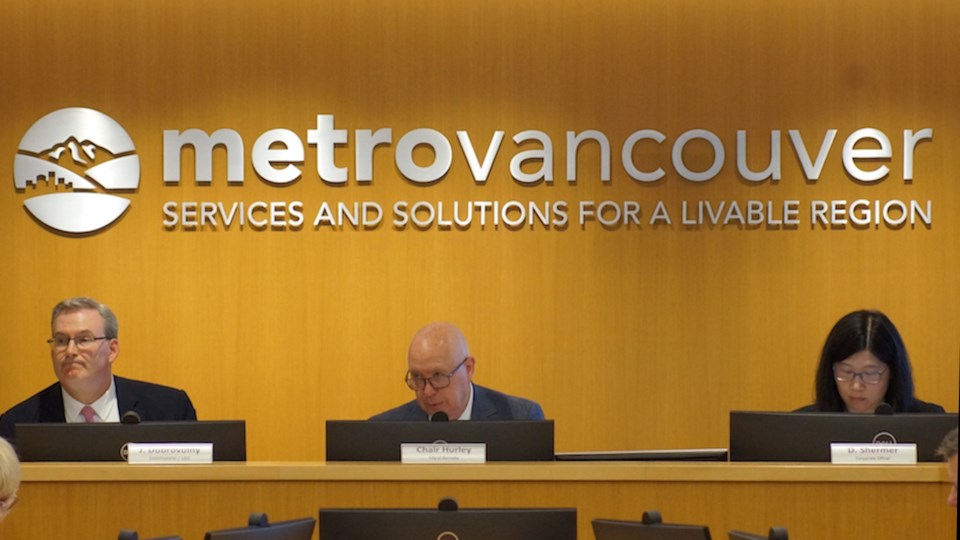A $21-million fund that recently supported an earthquake monitoring system for Metro Vancouver’s watershed was one of several accounts on the chopping block at the regional government’s special board meeting Friday.
This comes the same day a 5.1-magnitude tremor happened to strike just 40 kilometres north of said watershed.
Metro Vancouver chair Mike Hurley called the "cost efficiency review" meeting to discuss perceived “scope creep” although he himself said the government is not overstepping its bounds.
Metro Vancouver staff were asked to prepare a report on its operational services with the board to discuss what it ought to be funding, or not, and whether some services are better addressed by senior levels of government.
Preceding the meeting has been ongoing public concerns about Metro Vancouver’s spending and escalating infrastructure costs, namely the $3.9-billion North Shore sewage plant that was originally thought to cost about $700 million back in 2017.
The plant’s new price tag has resulted in a 25.3 per cent increase to Metro Vancouver’s property tax bill this year, and five per cent increases are earmarked for the next four years.
The average household will now pay $845 in 2025.
The $21 million “Sustainability Innovation Fund” supports ongoing “regional sustainability and climate action” projects related to air quality, conservation and housing, according to a staff report.
Delta Coun. Dylan Kruger and Port Coquitlam Mayor Brad West were most vocal about axing spending.
Kruger said $21 million could be redirected back to taxpayers, as cost of living is their primary concern.
West said he wanted the board to examine specific services and not necessarily axe any given fund in its entirety.
Others such as North Vancouver Mayor Linda Buchanan and Vancouver Coun. Lisa Dominato suggested relatively small budget items will only amount to a few dollars off a tax bill.
Buchanan suggested the board get on with its governance review and look at ways to address infrastructure costs, which are by far the biggest expense.
“As a cynic, you may think that this approach is a distraction to what’s really going on,” said Buchanan.
Some directors said the services on the chopping block are relevant.
“This stuff is directly related to our core services,” said Area A director Jen McCutcheon.
Still, West said the meeting was to address scope, suggesting other matters will be handled in other meetings.
“The question is whether it’s the role of Metro Vancouver to be funding these and we’ve had lots of discussion on what are our core responsibilities,” said the Port Coquitlam mayor.
Ultimately the board voted 94-50 (weighted voted) to not scrap the Sustainability Innovation Fund.
But such arguments only worked to a point, as the board decided to terminate a $300,000 grant to the Fraser Basin Council, which conducts climate change-related policy work.
West noted the council’s funding supports electric vehicle adoption for retailers, as an example.
“Are we really wanting to give EV subsidies for Ikea and The Brick? We are far, far away from water, sewer and solid waste, folks,” said West.
Delta’s Kruger also took aim at regional climate policy co-ordination, although a decision on its future was also deferred by the board.
“It is still top of mind for people, and we do have a role to play,” said Vancouver’s Dominato.
Kruger was also vocal in defunding Invest Vancouver, a $4.2-million office of economic advisors who aim to attract private investment to the region.
“Since 2022, Invest Vancouver has landed 18 companies worth a total of $1.3 billion in investment and 962 jobs across the Metro Vancouver region,” the staff report stated.
The board voted 74-63 to only receive the report for information.
A notable objection to Invest Vancouver came from Surrey Mayor Brenda Locke, who believes the regional government’s interests are not balanced toward communities south of the Fraser River.
“Certainly, Surrey has its own economic development program and others do as well,” said Locke.
Other matters that the board received for information included: Culture grants worth $300,000; a $580,000 information booth at the PNE; and $160,000 for the Seymour Salmonid Society to operate the Seymour River Hatchery.
The board also chose not to alter its 9-1-1 call transfer service.
Much of the meeting was held in camera, which could mean the board discussed impact on staffing levels if programs are cut.
The 9 a.m. meeting adjourned at 1 p.m. without the board completing the entire staff report. Had directors gone over four hours they would have been paid double their $547 per meeting base salary.
“I think this board is not capable of governing itself,” said Langley Township Mayor Eric Woodward.


